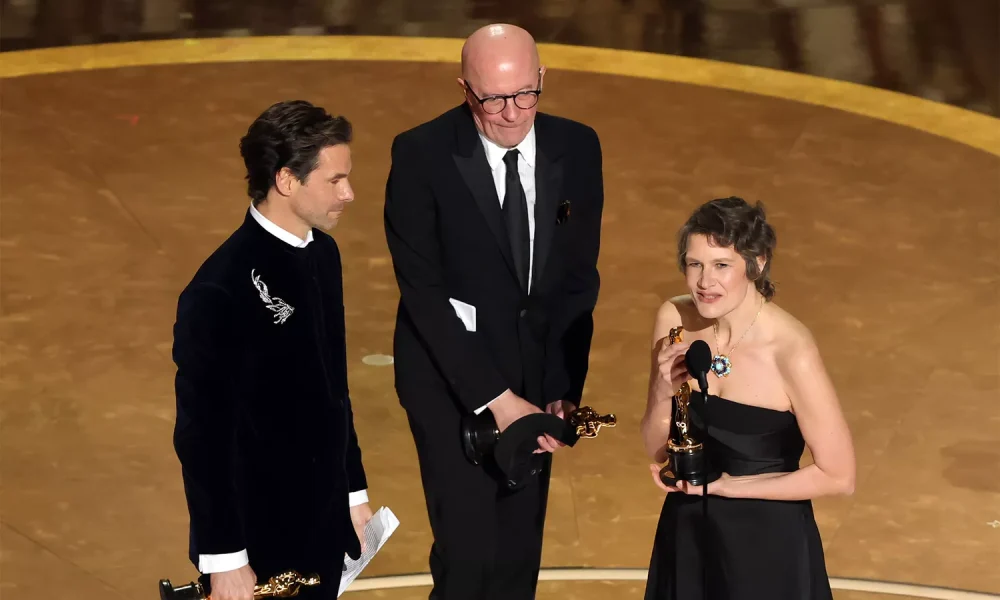Director Jacques Audiard has sparked controversy following his acceptance of an Oscar for Emilia Pérez, after claiming he didn’t speak about trans issues during his speech because he “didn’t win” Best Director or Best Film. The remark has drawn sharp criticism, with many questioning his commitment to the film’s central message about the transgender community.
On Sunday, March 2, Audiard and the Emilia Pérez team took to the stage at the 97th Academy Awards to accept the Oscar for Best Original Song for the film. While his collaborators, Clément Ducol and Camille, took the opportunity to speak, Audiard remained mostly silent during the ceremony. When he was later approached by reporters in the press room, Audiard explained that he had refrained from addressing the transgender community during his acceptance speech, stating, “Since I didn’t win Best Film or Best Director, I didn’t have the opportunity to speak. But had I had that opportunity, I would have spoken up,” before laughing and stepping away from the microphone.
This response has left many disappointed, especially given the film’s plot, which centers on a transgender Mexican cartel leader, Emilia Pérez. The film touches on themes of gender identity, transition, and the challenges faced by transgender individuals, making the absence of any mention of trans rights at the Oscars especially glaring.
Emilia Pérez, a Spanish-language French musical, has already been a subject of controversy since its release. The movie tells the story of Emilia, played by Karla Sofía Gascón, who transitions with the help of a lawyer and ultimately becomes a powerful cartel leader. While the film has received critical acclaim in some circles, it has also faced backlash for its portrayal of trans issues and for what many consider an insensitive treatment of Mexican culture. Audiard’s admission that he didn’t do thorough research into Mexico before making the film only added fuel to the fire.
One particularly controversial aspect of the film was a musical scene where Zoe Saldaña’s character, Rita, sings about gender-affirming surgery. The moment, considered tone-deaf by many, quickly went viral on social media, furthering criticisms of the film’s handling of sensitive topics.
Moreover, Gascón, the film’s lead actress and the first openly transgender person nominated for an Oscar, faced her own scandal. In recent weeks, it was revealed that Gascón had posted a series of problematic tweets between 2020 and 2023, including anti-Muslim sentiments, controversial remarks about the Oscars’ diversity efforts, and offensive comments regarding George Floyd and the Black Lives Matter movement. This controversy ultimately tarnished her chances of winning the Best Actress award, despite her being seen as a favorite in the category.
Despite these setbacks, Emilia Pérez took home two major Oscars at the ceremony: Best Supporting Actress for Zoe Saldaña and Best Original Song. However, many observers were disappointed by the lack of acknowledgment for the transgender community during the speeches, especially considering the film’s thematic focus on trans issues.
The silence on trans rights was felt particularly acutely when Audiard, Ducol, and Camille accepted the award for Best Original Song. While the collaborators expressed gratitude, none mentioned the trans community, despite the fact that Emilia Pérez centers on the experiences of a transgender character. Audiard’s explanation in the press room, that he didn’t win and thus didn’t have the chance to speak, seemed to ignore the opportunity he had just been given to address the ongoing struggles of the trans community, particularly in light of the escalating attacks on transgender rights in various parts of the world.
Social media users were quick to react to Audiard’s comment. One user pointed out, “Yeah, that’s not what you do when you actually care.” Another tweet expressed frustration: “Oh right, because trans rights are only important enough to speak on when you win an award. Literally get fucked.”
Others were equally vocal in their disappointment: “Emilia Pérez walked away with two Oscars, a new meme, and literally no mention of trans lives.” Another observed, “None of the Emilia Pérez winners or team mentioned the trans community at the Oscars, which is wild.”
In stark contrast, the team behind Anora, a film about a young sex worker from Brooklyn, won widespread praise for repeatedly acknowledging the sex worker community during their acceptance speeches. The independent movie about the challenges of a young woman marrying the son of an oligarch earned several major wins, including Best Picture, Best Original Screenplay, Best Director, and Best Actress. Throughout the night, the filmmakers and actors of Anora made a point of highlighting marginalized communities, which resonated strongly with audiences.
The lack of a statement on trans rights by the Emilia Pérez team, especially given the film’s premise, has left many to question whether the filmmakers were truly committed to the causes they claimed to represent. Critics argue that Audiard’s dismissal of the opportunity to speak on such a crucial issue only underscores the film’s superficial engagement with transgender issues.
The Oscars, as one of the most-watched events in the entertainment industry, often serve as a platform for filmmakers to make a statement about social and political issues. The absence of such a statement from Audiard and the Emilia Pérez team has sparked frustration among those who had hoped the film’s success would be an opportunity to amplify the voices of the trans community, particularly during a time when transgender rights are under increasing attack in many parts of the world.
As the conversation around Emilia Pérez continues to evolve, it remains to be seen how the film will be remembered. While it certainly made an impact at the Academy Awards, the controversy surrounding its portrayal of trans issues and the filmmakers’ failure to use their platform to speak up for the trans community could overshadow its Oscar wins.
For now, Audiard’s silence on trans rights at the Oscars remains a point of contention, with many questioning whether the director truly understands the weight of the story he helped bring to the big screen.


